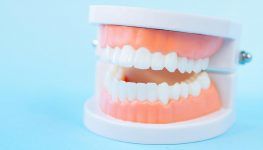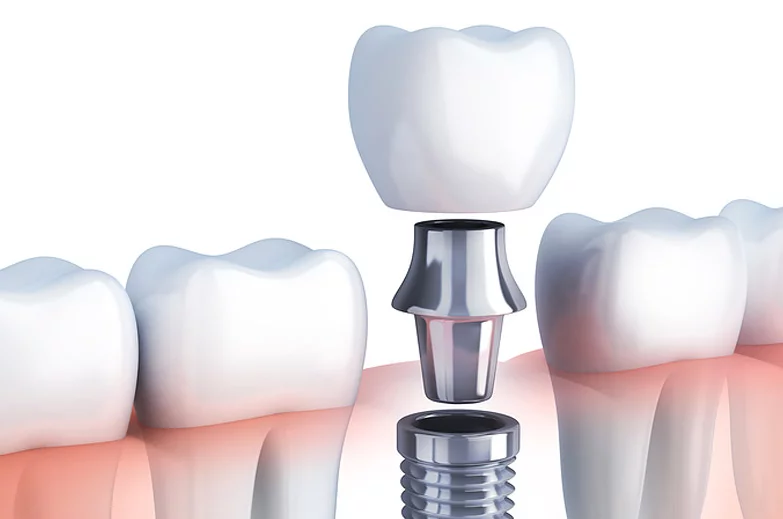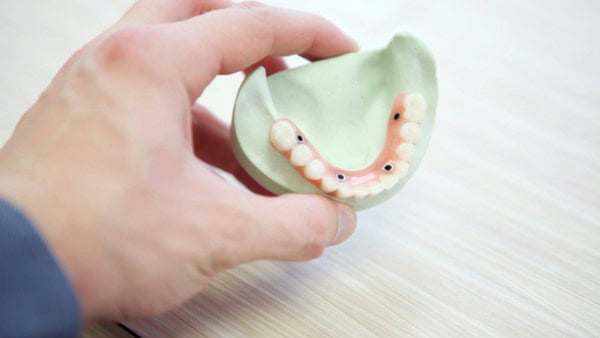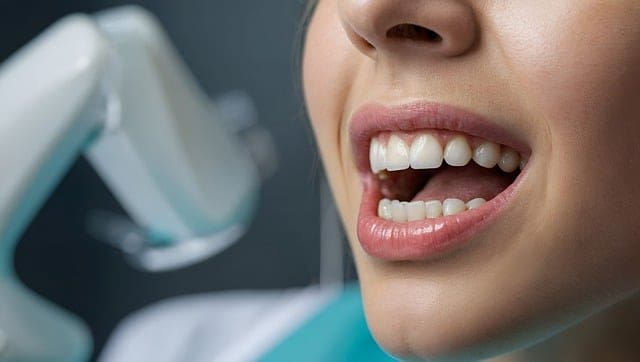If you have lost some or all of your teeth due to decay, gum disease, or injury, dentures can help you regain your natural speech and enjoy eating comfortably again.
Whether you are missing just one tooth or several, dentures bring many benefits—though the choice, of course, is yours to make.
This is an overview of dentures written to guide you in understanding these dental appliances and how they can support your dental health.
What Are Dentures? Your Complete Guide from a Central NY Dentist
Dentures, or false teeth, are removable dental prosthetics. They can help you replace a single tooth (partial denture) or all of your teeth (full denture) in the upper and lower jaws.
Dentures are made of acrylic and look and feel just like real teeth.

Denture Terminology Every Central NY Patient Should Know
- Immediate dentures—your dentist will place these in your mouth immediately after removing your damaged or decayed teeth. Sometimes, a soft lining material is placed on the gums to enable the dentures to sit comfortably on the healing gums.
- Conventional dentures: these dentures are used for four to eight weeks after teeth removal and post-gum-healing. Your dentist will adjust these multiple times until the fit is comfortable.
- Complete dentures—also called full mouth dentures—help replace all of the teeth in the upper and lower jaws.
- Partial dentures: if you have one missing tooth or just a few missing teeth, you can go in for partial dentures. These come with plates or clips that can be attached to your adjacent teeth to help them stay in place. These dentures do not take as long to adjust as full dentures do.
Dentures: Pros and Cons Explained by Central NY Experts
Top Advantages of Dentures for Missing Teeth
Dentures have several advantages:
- Durable: some last for 3-5 years
- Improved appearance: dentures replace missing and decayed teeth, which can undermine your confidence
- Improved speech
- Improved chewing ability.
- Economical, especially compared to other teeth replacements like dental implants
Common Disadvantages of Dentures You Should Consider
- Dentures significantly impact appearance and speech—this can erode one’s self-confidence
- They sometimes result in gum sores, which makes it uncomfortable for the patient to wear them
- There is a learning curve involved; some patients take over 6 months to learn to eat with dentures. You may have to visit the dentist several times to adjust them for a comfortable fit.
- Compared to natural teeth, dentures only have 25% chewing efficiency
- Dentures have a plastic roof that can interfere with the taste. Taste is further impacted if they need glue to hold them in place.
- Dentures do not stop bone loss.
- The uneven pressure of dentures causes them to bounce over the gums hundreds of times a day. Over time, this can result in shrinkage and structural damage to the lower thirds of the face.
Dentures Vs. Dental Implants: Which Is Right for You?
More patients around the world are known to prefer dental implants over dentures. A comparison between dental implants vs dentures shows that implants offer several advantages, such as improved appearance and comfort. They do not impact taste and speech and they also have the same chewing efficiency as natural teeth.
The biggest advantage of dental implants over dentures is that you need not remove them for cleaning. This gives you peace of mind knowing that the teeth are permanent. You cannot lose or misplace your implanted teeth, which is not the case with dentures.

Benefits of Dentures Over Dental Implants for Central NY Patients
Some patients are not good candidates for dental implants. These patients can use dentures to replace missing or decayed teeth.
Some reasons why dentists may recommend full mouth dentures over implants are:
- Insufficient or poor bone quality
- Inadequate amount of space between upper and lower teeth
- Presence of vital anatomical structure close to the proposed implant site
- Still growing mouth or face
- Certain chronic diseases: diabetes, osteoporosis, chronic sinus troubles
- A risk of interference between the integration of bone and implant
- Heavy smokers
Who Is a Good Candidate for Dentures? Find Out Here
To find out if you are a good candidate for dentures, your dentist will evaluate your complete medical and dental history. The dental clinic will take several impressions (molds) of your mouth to plan the denture models. They may also take several x-rays. Following this examination, your dentist will recommend the right type of dentures for your mouth.
Step-by-Step Denture Procedure Explained
The provision of dentures is a multi-step process that may take 5–6 weeks and multiple visits to the dental clinic.
- Based on the impressions, the dental lab technician will create wax models.
- Your dentist will use these wax blocks to assess how your jaws relate to each other and how much space needs to be between them.
- Based on this, the lab technician will make impression trays, which will fit your mouth more precisely.
- The dentist will then take very accurate impressions using these bespoke trays.
- The lab technician will provide try-in dentures with teeth temporarily mounted in wax gum. Your dentist will fit these and assess them for color, shape, fit, and comfort.
- Once you and your dentist are happy, the lab technician will make the finished dentures.
Potential Problems with Dentures & How to Fix Them
Eating with dentures takes practice. In the beginning, you may want to eat soft food cut into small pieces. You must chew slowly in the beginning. Once you get used to the dentures, you can try new foods. However, it is best to avoid hard and sticky foods.
Some people have trouble pronouncing certain words. However, this diminishes with time. If speech problems persist, call your dentist. Dentures tend to slip occasionally when you laugh or sneeze. Reposition them if that happens.

How to Care for Dentures to Make Them Last
Dentures for missing teeth tend to accumulate germs and bacteria so you must clean them daily. You should not wear dentures 24/7; they need a few hours of rest and air circulation daily.
- Brush your dentures twice a day.
- If you use denture fixative, remove it at every cleaning.
- Do not use harsh, abrasive toothpaste to clean the dentures. Use special denture cleaning agents available on the market.
- Soak the dentures in warm water. Never use boiling water, as heat could damage the dentures and even crack them.
Contact a Denture Specialist in Central New York
With the right affordable denture treatment, you can enjoy normal eating, drinking, and smiling again. Learn your options by contacting our top restorative dentistry specialist today!

Central New York Dentures FAQ
What are the best dentures in Central New York?
The best dentures in Central New York depend on your needs. Full dentures replace all teeth, while partial dentures work for a few missing teeth. High-quality acrylic dentures are often recommended for durability and comfort.
How much do dentures cost in Central New York?
Denture costs in Central New York vary, but on average, they range from $800 to $3,500 per arch. Prices depend on the materials used and the complexity of the case.
Are dentures covered by dental insurance in Central NY?
Many dental insurance plans in Central New York cover part of the cost of dentures, especially if they are considered medically necessary. Check with your provider for specific coverage.
What’s the difference between full and partial dentures?
Full dentures replace all upper or lower teeth, while partial dentures fill in gaps when some natural teeth remain. Both are common options for patients in Central NY.
How do dentures compare to dental implants?
Dentures are removable and more affordable upfront, while implants are permanent and cost more initially. Many Central NY dentists offer both options and can advise based on your needs.
How long do dentures last?
Most dentures last between 5 to 7 years with proper care. Regular checkups with your Central New York dentist can extend their lifespan.
Do dentures hurt?
New dentures can cause mild discomfort as your mouth adjusts. Central NY cosmetic dentists often recommend soft liners or adjustments to improve comfort.
Can I eat normally with dentures?
It takes practice, but most people in Central New York can eat comfortably with dentures after a brief adjustment period. Starting with soft foods helps.
How do I clean my dentures?
Clean dentures daily with a soft brush and non-abrasive cleanser. Soak them overnight and rinse before wearing. Your Central NY dentist can recommend products.
Who is a good candidate for dentures in Central NY?
Good candidates for dentures include people with multiple missing teeth, significant tooth decay, or gum disease. A Central New York dentist can assess your eligibility.


